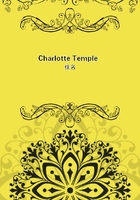
第52章
CONCLUSION.
SHORTLY after the interment of his daughter, Mr. Temple, with his dear little charge and her nurse, set forward for England.
It would be impossible to do justice to the meeting scene between him, his Lucy, and her aged father. Every heart of sensibility can easily conceive their feelings. After the first tumult of grief was subsided, Mrs. Temple gave up the chief of her time to her grand-child, and as she grew up and improved, began to almost fancy she again possessed her Charlotte.
It was about ten years after these painful events, that Mr. and Mrs. Temple, having buried their father, were obliged to come to London on particular business, and brought the little Lucy with them.
They had been walking one evening, when on their return they found a poor wretch sitting on the steps of the door.
She attempted to rise as they approached, but from extreme weakness was unable, and after several fruitless efforts fell back in a fit.
Mr. Temple was not one of those men who stand to consider whether by assisting an object in distress they shall not inconvenience themselves, but instigated by the impulse of a noble feeling heart, immediately ordered her to be carried into the house, and proper restoratives applied.
She soon recovered; and fixing her eyes on Mrs. Temple, cried--"You know not, Madam, what you do; you know not whom you are relieving, or you would curse me in the bitterness of your heart. Come not near me, Madam, I shall contaminate you.
I am the viper that stung your peace. I am the woman who turned the poor Charlotte out to perish in the street. Heaven have mercy!
I see her now," continued she looking at Lucy; "such, such was the fair bud of innocence that my vile arts blasted ere it was half blown. "It was in vain that Mr. and Mrs. Temple intreated her to be composed and to take some refreshment. She only drank half a glass of wine;and then told them that she had been separated from her husband seven years, the chief of which she had passed in riot, dissipation, and vice, till, overtaken by poverty and sickness, she had been reduced to part with every valuable, and thought only of ending her life in a prison; when a benevolent friend paid her debts and released her; but that her illness encreasing, she had no possible means of supporting herself, and her friends were weary of relieving her. "I have fasted," said she, "two days, and last night lay my aching head on the cold pavement:
indeed it was but just that I should experience those miseries myself which I had unfeelingly inflicted on others."Greatly as Mr. Temple had reason to detest Mrs. Crayton, he could not behold her in this distress without some emotions of pity.
He gave her shelter that night beneath his hospitable roof, and the next day got her admission into an hospital; where having lingered a few weeks, she died, a striking example that vice, however prosperous in the beginning, in the end leads only to misery and shame.
FINIS.